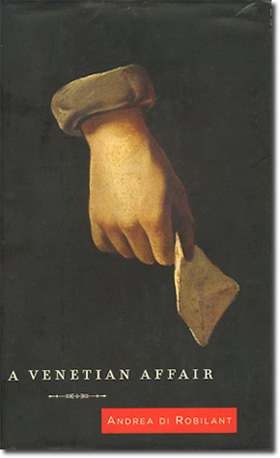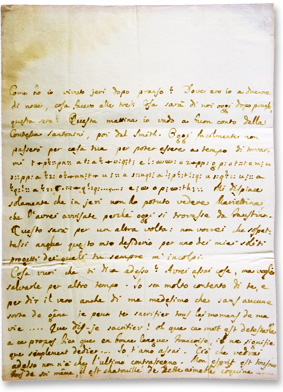

A Venetian Affair
About this book
"You revealed all the mysteries of life to me. You gave thunder to my soul. You made my
spirit delicate and noble" [p. 153]. These are the words of GiustinianaWynne, a young
Anglo-Venetian beauty, to her secret lover Andrea Memmo, in eighteenth-century Venice.
Andrea di Robilant’s elegant and meticulously researched book about them grew out of
his father’s discovery of a cache of their clandestine love letters, found in the attic of his
family’s former Venetian palazzo two hundred years later. Together the author and his
father cracked the lovers’ hieroglyphic code and discovered a correspondence that evokes
the great love stories of literature, as well as the cultural and political intrigue inherent in
every sphere of daily life, public and private, during this climactic period in history.
GiustinianaWynne meets Andrea Memmo when she is only sixteen, and he is not
much older. They fall passionately in love, but are prevented from openly pursuing the
ordinary course of love and marriage by her mother, his family, and the rigid social
structure in which they live. But these are no ordinary teenagers. Tenacious, talented,
and philosophical, they try for years to engineer various plans intended to bring them
together in spite of class differences, governmental opposition, and prolonged separation.
All their efforts fail in conventional terms, but they succeed in remaining lifelong friends.
Their correspondence, which was necessarily secret in their lifetimes, is now public
and is a literary achievement perhaps more enthralling than any novel, because of its
historical truth.
Andrea di Robilant weaves these letters into a poignant narrative of love as it adapts
and evolves. Over the course of their story, the lovers’ plans are undermined many times
when their secret letters are intercepted and read by the wrong people. But it is a happy
accident that allows readers today to intercept these intimate confessions—confessions
that, despite their historical distance, have much to say about love and marriage in our
own time.
"Splendidly engrossing . . . [An] extraordinary story."
—The New York Times Book Review
Excerpt. Chapter One
Early in the evening Andrea caught up with Giustiniana at the theater. She was radiant in
her brocaded evening cape, and the anxious way she was looking around for him made
her seem lovelier than ever. She smiled as she saw him, and they exchanged a few signals
from a safe distance, apparently without raising Mrs. Anna’s suspicions. After the play,
Andrea followed mother and daughter to the Ridotto, keeping close to the walls of the
narrow streets and casting nervous glances ahead. In the gambling halls, among the latenight
crowd of masked men and women hovering around the faro tables, he had a much
harder time avoiding Mrs. Anna as she flitted in and out of the shadows in the candlelit
rooms. He was terrified she might suddenly come upon him and make a horrible scene.
Unnerved by all the difficulties, he finally gave up and went home without having had his
cherished moment alone with Giustiniana.
That night he hardly slept, shifting restlessly in his bed, wondering if he had abandoned
the Ridotto too abruptly and not made it sufficiently clear to Giustiniana why he was
leaving the scene. The next morning he rose early and wrote to her at once:
My beloved,
I am very anxious to know whether your mother noticed anything last night—any act
of imprudence on my part—and if you yourself were satisfied or had reason to be cross.
Everything is so uncertain. At the theater things didn’t go badly, but at the Ridotto—
I don’t know how it all ended at the Ridotto. As long as I was in your mother’s range I
tried to conceal myself—as you probably saw. And rest assured that when I did not show
myself to you it was because Mrs. Anna was looking in my direction. Once you left the
rooms I no longer saw our tyrant and imagined we had lost her for good—your own
gestures seemed to suggest as much . . . read more
Readers Guide
1. "Some years ago my father came home with a carton of old letters that time and
humidity had compacted into wads of barely legible paper" [p.3]. For di Robilant, this
book is not mere historical research, but a tribute to his father and his family. Andrea
Memmo is his ancestor. Does the author’s style of narration reflect his identification
with the characters?
2. What are the elements of romance in this story? What is the significance of clandestine
love, intercepted letters, delayed gratification, and fantasy in Giustiniana and Andrea’s
love affair? How might their strong and long-lasting attachment have been different if
they had been allowed to marry? ... for more readers guide